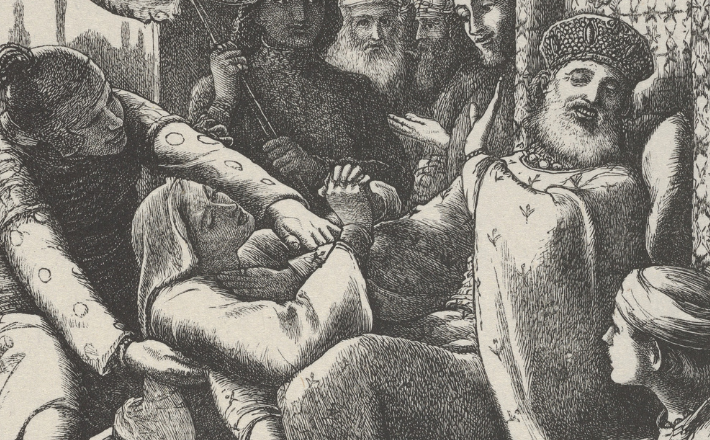Commentary on Jeremiah 31:27-34
The promise of a “new covenant” in this passage may evoke the Christian scriptures, stories, and promises for many readers.1
Yet in their original context, these words signified the promise of a faithful God to a devastated people for restoration, perhaps even in their lifetimes.
Jeremiah lived through the demise of his civilization when the Babylonians invaded Judah, assaulted Jerusalem, and reduced the temple to rubble, exiling or killing the royal family, priests, prophets, and the majority of the population. The resulting chaos may be unimaginable to readers who have not lived through war and its aftermath in their own land. Here in the United States, those who survived the attack on Pearl Harbor or the attacks on the World Trade Center will have experienced some of what the citizens of Judah saw and felt. However, in neither case did the US government—or even those of Hawaii or New York—fall. In fact, in both cases governmental, religious, and social organizations responded immediately, demonstrating the preservation of American institutional life.
In Judah in 586 BCE, broken families would have been ravaged by grief and loss; those left behind would have had to scramble to find surviving relatives and a place to sleep if their homes had been destroyed. Produce and food animals were either destroyed or taken. Every object of value was plundered. Anyone with any authority or skill to help rebuild the society was dead or gone.
And for those who asked “Why?” there were the words of Jeremiah (26:18), and Micah (3:12), whom he quoted, predicting the conflagration: God would destroy Judah and Jerusalem for their sin, specifically the injustices of their officials. Now the day of Zion’s destruction had come upon them. They had only to look to the north to see the remnants of the fallen Northern Monarchy that had never risen from its defeat and destruction at the hands of the Assyrians. Surely all hope was lost.
Yet God had not abandoned the people. God spoke to and through Jeremiah. The same God who planted the garden of Eden and crafted humanity from its soil will replant Judah. God will replant, tend, and nurture human and animal life amid the ashes of Judah, Jerusalem, and the temple.
Perhaps most significantly, in 31:29, God promises to cease holding subsequent generations responsible for the transgressions of previous ones: “In those days they shall no longer say, ‘The parents have eaten sour grapes, and the children’s teeth are set on edge.'” Instead, according to verse 30, “all shall die for their own sins; the teeth of everyone who eats sour grapes shall be set on edge.” The remission of the sin of the past generations gives the survivors and their descendants an opportunity to start their lives over with God as they rebuild their homes and nation. This promise was so important that God also sent it to Ezekiel, exiled in Babylon (Ezekiel 18:2–4).
This new beginning will be at a time not specified—”the days are surely coming”—accompanied by a new covenant. God will make, literally engrave, this new covenant on the hearts of the people, instead of on tablets that can be lost, stolen, or broken. Of course, hearts can be broken, and God alludes to God’s own heartbreak with previous generations of Israelites in verses 32–34.
The language is tender: “I took them by the hand” and “I married them” in verse 32. (The latter phrase is translated “I was their husband” in the New Revised Standard Version.) God is willing to start over with them and make it easier for God’s people to keep the covenant; this time God will engrave the Torah (“revelation,” “teaching,” and “law”) on their hearts (verse 33). They will not have to be told (or taught) to (get to) know the Lord, for the knowledge of the Lord will be implanted within them.
The dominant Christian exegesis of this passage holds that the “new covenant” is both another, different covenant and is either the covenant of the New Testament or its message (or both). However, the passage does not specify that this will be a different covenant in terms of content, but rather in terms of acceptance and fidelity. The references to the exodus in verse 32 suggest the covenant at stake is the Sinai covenant—indeed, the Christian scriptures affirm the Sinai Covenant, including and particularly the Ten Commandments.
Belief in the New Testament as a continuing scriptural revelation does not require an invalidation of previous covenants. What will be new about this covenant is its internalization. God will write it on the hearts of the people because apparently, even with the best teachers, preachers, prophets, and priests, people were failing to learn the lessons of the covenant. Therefore, they failed to keep it. This new covenant will require no work on the part of the people to receive and adopt. It will be engraved upon their hearts.
The passage ends with a commitment from God to forget their sin for all time. These words promised desperately needed hope to the survivors of the invasion. The God of creation would re-create them. The God of exodus would embrace them again. The merciful, tender, loving God would forgive all their sin and absolve them of the sins of their ancestors. The sin that led God to surrender Judah and Jerusalem to the Babylonians would be forgiven.
Jeremiah’s words were recorded and remembered, preserved, and reckoned as scripture. They have come down through time to us as living words of God in part because they nourished famished souls at their most desperate hour. This week’s epistle (2 Timothy 3:14–4:5) affirms the production of scripture—referring to the Hebrew, Greek, and Aramaic texts of the “Old Testament,” the only testament at that time—as a sign of God’s faithfulness in and to the world.
Notes
- Commentary previously published on this website for October 17, 2010.


October 19, 2025